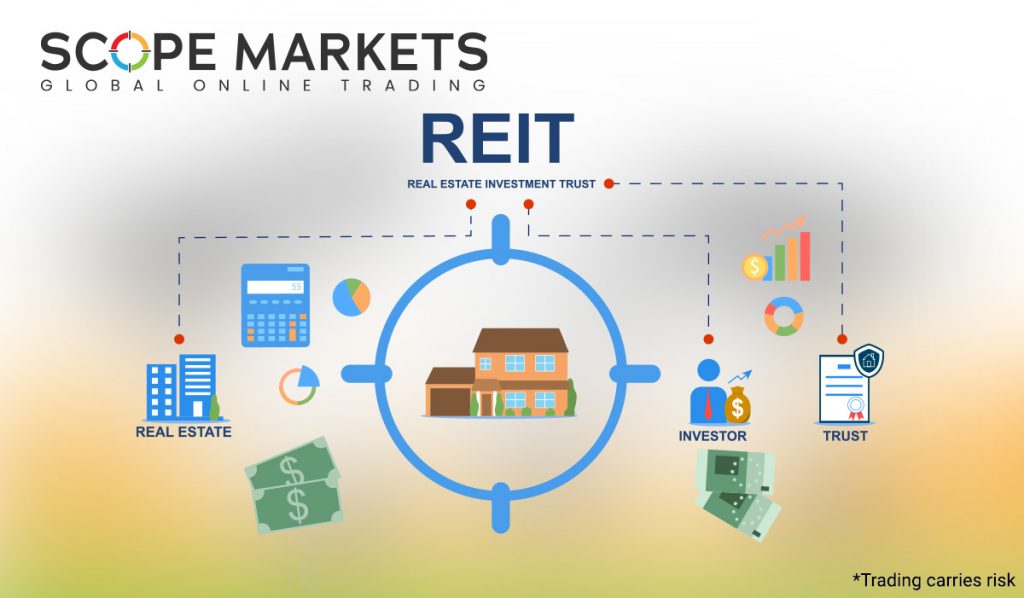Learn all about REIT Stocks and Their Historical Performance

Contents
REITs or Real Estate Investment Trusts, are investment assets generally used by investors who wish to increase the profit on their trade portfolio and fallowing the latest investments trends.
REIT stocks involve increased dividend yields, but just like any other financial product with good returns, it poses some risk. It is up to shareholders to determine if the profits are worth the risk.
Know all about REIT Stocks and Their Historical Performance
REITs are organizations whose individual business is possessing and running real estate holdings. Also, some invest in investment property like parking areas or office constructions. Usually, REITs should divide 90% of their earnings in the form of dividends, and make payments to their shareholders regularly, which creates them a suitable interest-earning medium for retirees who wish a constant flow of earnings. Unlike public companies, REITs don’t pay collective income tax.

The earnings after management write-offs are generally divided pre-tax to shareholders of REIT stocks. Historically, for long periods, REITs have exceeded corporate debentures.
Is There Any Risk of Investing in REITs?

REITs are often exchanged on the stock market, which signifies that they are a high-risk product, which is expected from more perilous equity stakes. They also get affected negatively by instability in real estate costs. Even though the long-term returns of REITs are effective, there have been times in which they have had substandard performance. In 2007, Dow Jones, the US iShares Real-Estate ETF yielded -20.35%, this was followed by an interest of -40.03% all through the explosion of the real-estate bubble in late 2007 and early 2008.
REIT stocks can also generate negative returns when interest rates are increasing. When interest rates reduce, shareholders leave secured assets to explore revenue in different regions of the market. On the contrary, when interest rates are increasing or during unpredictable times, shareholders often drift again to US Treasuries or different planned-income investments.
REITs can sometimes be misclassified as substitutes to bonds. It is however important to note that, Real Estate Investment Trusts are not bonds and they do not behave as bonds would, they are assets or equities. Like all equities, they carry risk, which is higher than government bonds.
Benefits of Investing in REITs
REITs play a significant role in investment holdings as they may provide powerful, seasonal, yearly earnings and the possibility for lasting funds appreciation. REIT’s complete return review for the past 20 years has exceeded the S&P 500, various indices, and inflation rates. As with every investment, REITs have benefits and risks.
Fortunately, REITs are easy to buy as well as sell. Since most trade on federal exchanges—a characteristic that alleviates a few of the common shortcomings of real estate. Performance-wise, REITs provide engaging risk-adjusted yields and steady cash flow. Furthermore, real estate proximity can be effective for a portfolio as it gives diversification and share-related benefits. Also, the yields are usually higher than you may gain with different investments.
Comparison of Historical Performance of REIT Stocks vs. US Stocks
As the impact of COVID-19 extends, worries about its end in the economy and the US stock market have increased. With no definite conclusion in view, shareholders are managing doubt about their lasting financial strength. In as much as it is exciting to stay fixed to the newest return data, it is essential to keep in mind that many Americans have invested in assets for retirement, not for day trading. However, REITs have performed poorly compared to the rest of the stock market in 2020.
This study reveals that REIT stocks are the best choice when considering long terms returns. Usually, REITs perform poorly compared to the rest of the stock market when gains are estimated yearly. However, over an extended period REIT stocks outperform US Stocks. Whereas previous performance is not a guarantee of future returns, this is a standard long term ‘buy and hold’ product that shareholders should consider.
The chart below exhibits the normal yearly alternating 10-year standard returns for REIT stocks and the Russell 3000 Index for every month beginning Jan. 2000 and ending Oct. 2020. In more current history, REIT stocks have exceeded the wider stock market, even through the biggest financial crisis. To an extent, this is because of increased non-REIT interests in the initial 2000s because of the technology bubble for the Russell 3000 Index, which gives the 10-year yields a more powerful starting point. The chart depicts the reduced variability of 10-year gains of REITs. The standard variation for 10-year yields for the 2 series exhibited in this chart is 9.0% for REIT stocks as assessed against 16.0% for US stocks of the US.

When we consider an even more extended time range, REIT’s durability appears to be more emphasized. The chart below exhibits the common 20-year profits for REITs vs. U.S. stocks. REITs’ better results get supplemented by a reduced standard deviation of approx. 6.0% as assessed with 13.8% for US stocks.

Estimating average yearly revenues for the current REIT period, beginning in the earlier phase of the 1990s, the more extended the period the more effective REITs work as evaluated with the wider stock market of the US.
The chart below outlines the ratio of months in which REITs exceeded U.S. stocks at accumulating years of retaining length. Considering yearly returns, REITs exceeded U.S. shares by over 56% of the course. When profits of REITs are estimated in nineteen years or more, REITs exceed stocks of the US each month.
In the first chart, REITs have not performed well in a 10-year time for March 2020. But, defeated in each period of more than sixteen years. Whereas historical performance is not surety of prospective returns, REITs possess a powerful track record of profits for investors who are investing for the long term.

Reasons you should invest in REIT Stocks
REITs are often considered a complete profit investment. They generally offer increased profits plus the possibility for steady and long-term funds recognition. A long-term complete return of REIT stocks tends to be like those of utility stocks and over the returns of reduced risk securities.
Due to the powerful dividend earnings that REITs offer, they are a significant investment for retirement saving and for retirees who need a permanent income flow to fulfil their living costs. REIT earnings are helpful as they often needed to share approx. 90% of their assessable income to their stockholders yearly.
Their profits are generally stoked by the constant flow of contractual leases given by the renters of their possessions. A comparatively low association of indexed stock returns of REITs with different equities as well as fixed-pay also makes REITs the best portfolio modifier.
Methods for Investing in REITs

You can invest in openly traded REITs in addition to REITs mutual funds and ETFs—only by buying stocks via a broker. You can buy stocks of a non-exchanged REIT through a stockbroker who takes part in the non-exchange offering of REITs.
These stocks are also involved in growing profit and supplemented financing plans. An expected 87 mn U.S. shareholders buy REITs via their savings of retirement and different investment stocks.
There are over 225 openly traded REITs in the United States, which signifies that you will need to do some research before you choose any REIT to buy. Make sure to analyze the REIT’s control team and check the record—and understand how they get remunerated. If it is payment based on performance, then chances are they will be performing hard to select the correct investments as well as the best tactics.
It’s also the best approach to consider numbers like expected growth in profits per stock and present earnings yield. A useful figure is the REIT’s FFO (funds from operations), which is usually determined by appending devaluation and amortization to interests and then deducting any profits on sales.
A True Example of REITs
One more factor to consider when selecting REITs is to consider segments of the real estate industry that are trending. Which trending or increasing segments of the market, in general, may get drawn into through real estate? Say, the healthcare segment is one of the quickly-growing segments in the United States—particularly in the development of medical constructions, outpatient supervision hubs, eldercare amenities, and retirement centers.
Many REITs concentrate on this industry. Healthpeak Properties—previously known as HCP— is an example. On 22 July 2020, it got a market capitalization of approx. 14.4 bn USD, with 5 mn stocks traded every day. Its trade portfolio concentrates on 3 key asset categories like life sciences amenities, medical departments, and elder residence.
Conclusion- REIT Stocks and Their Historical Performance
If you do not wish to trade REIT stocks, then it is sensible to buy an Exchange-traded fund or mutual fund that invests in different REIT stocks for you. You get instant change and reduced risk.
If you are searching for a sudden price rise, then you may think of different stocks first. REITs tend to be sluggish but have constant variation. Various brokerages provide these stocks and investing in them needs more concise legwork than looking for unique REITs to invest in.
References: https://www.nerdwallet.com/article/investing/reit-investing
Article Disclaimer
